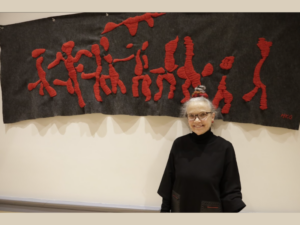“I am acutely aware that it is absolutely impossible for me to do justice to what the city deserves in terms of news.”
Julia Taliesin is the only reporter at the Somerville Journal, a newspaper that covers a city with 80,000 citizens. And although Taliesin has been praised by residents for her important work, she believes Somerville deserves more than just one multimedia journalist – it deserves a team.
Most of Taliesin’s days—pre-COVID, of course—last about twelve hours, starting with breakfast at 7:30 a.m. and ending anywhere from 7 p.m to 9 p.m. at city council meetings.
“I keep a daily to do list and then a weekly story list for myself,” Taliesin said, speaking of her busy schedule. She runs the Somerville Journal’s email and social media accounts on top of her reporting. “My hours absolutely do not fall regularly.”
Once coronavirus hit, Taliesin’s days underwent a transformation and became virtual.
“If I’m going to interview someone, [it’s] like this,” Taliesin said, gesturing to her computer screen with our Zoom meeting pulled up. “It’s just safer for everyone and easier if we do it virtually.” Taliesin said that one downside to the change is that it is difficult to get interviews with substance, because of the lack of face to face connection with the residents of Somerville she has come to know.
Unfortunately, COVID-19 isn’t the only strain on local news.
Taliesin, like many others, has suffered directly from media consolidation and slashing of resources. She has seen co-workers laid off and whole departments consolidated in attempts to cut labor costs.
“Already in my two years here, there have been so many transitions. I’ve already further witnessed the kind of impact today’s economy has on newsrooms,” Taliesin explained.
Layoffs affect the quality and quantity of journalism being produced. Despite Taliesin’s putting relentless work into the Somerville Journal, she lacks the resources and staff to cover a city of about 80,000+ people.
“I am acutely aware that it is absolutely impossible for me to do justice to what the city deserves in terms of news,” Taliesin noted. “What Somerville deserves is a handful of reporters who watch every city council meeting, or at least 90% of them, because this city council is busy. When I think of what effective news looks like, it’s just that. It’s just enough people to cover the issues. Not the press conferences and the press releases, but the actual work and the legislating that goes on.”
According to Bloomberg News, a lack of news coverage and dedicated journalists also affect community spending and governmental accountability. After all, who will keep politicians accountable if a journalist doesn’t hold them responsible and call them out?
In today’s age, Taliesin’s experience is mirrored throughout the country. The state of the news industry is worsening by the year, as local journalism becomes less and less profitable.
Data from the Pew Research Center shows that advertising revenue for U.S. newspapers in 2000 was 48 billion dollars. In 2018, that dropped to 14 billion dollars.
A 2015 study published in the Journal of Media Business Studies looked at the effects of downsizing on 2,159 journalists that had survived this process. The study found that, after downsizing, journalists were forced to take on larger workloads with fewer resources. They were also forced to take on responsibilities they had limited experience in.
“All of my co-workers have been called to do more with less,” Taliesin said about the downsizing that has wreaked havoc on the Somerville Journal.
With this strain on journalists, it is impossible for an organization like Gannett, which owns the Journal, to provide adequate reporting on any of its coverage areas. Though Taliesin is overworked and under-supported, at least Somerville has someone. Some places have no dedicated journalists or news outlets—creating what researchers at UNC Chapel Hill call “news deserts.”
According to the UNC study, “There are almost 200 of the 3,143 counties in the United States without any paper. An additional 1,449 counties, ranging in size from several hundred residents to more than a million, have only one newspaper, usually a weekly. More than 2,000 have no daily paper. ”
Taliesin knows this all too well. Medford, Massachusetts is one city that doesn’t have a dedicated journalist. It is only one of many towns in America left voiceless due to nonexistent or inadequate local news.
Taliesin said some residents of Somerville reached out to her to express frustrations with her reporting, claiming she didn’t cover things important to Somerville—mostly certain legislative actions. However, when they realized her byline was on every piece in the Somerville Journal, they understood that she was doing her best to cover Somerville news alone.
Bill Shelton, a member of the Somerville News Garden, a local news initiative that is working to revitalize Somerville’s local news coverage, described Taliesin as “working like a one-legged woman in an ass-kicking contest.”
“One thing that has struck me about being a reporter in Somerville is that many of the people just care. They care deeply. And I think before I took that personally when people were angry or frustrated with me, when I didn’t get to something or didn’t do something right. … I don’t think that anymore. People are just invested. And that gives me hope,” Taliesin said with a smile.
Her skeptical mind is a little more uncertain, however. Taliesin believes that free content has caused a lot of people to decide that news is not worth investing in. Why would someone pay for news when they can find the same information for free on social media, or by using someone else’s login?
“If people want news, people have to invest in it somewhere,” she said. “Someone, somewhere, has to pay for it. Journalists deserve compensation.”
What the news industry desperately needs is support. It needs either significant donations or government help, like subsidies or tax cuts. With ad revenue plummeting, the only thing that is certain is that the news industry needs a break to survive.
Taliesin gets a lot of her news from podcasts and would love to be able to create audio stories for Somerville residents. However, without more resources and more people-power in her newsroom, she can’t produce multimedia for her readers. She also can’t do it alone.
“News is changing. The print newsroom isn’t what we’re dealing with anymore. So now how do we shift and provide quality journalism to communities that desperately need it?” Taliesin asked. “Until there are more resources, I think it will be hard to rethink and restrategize how we present news.”
Taliesin wishes she could think about revamping local news more, but her workload doesn’t allow for much free time. Alternative news organizations like DigBoston and the Somerville News Garden give Taliesin some hope, though. She believes in citizen journalism, specifically organizations that want to re-evaluate the news model.
“I do have faith that there are people … who are talking about these issues,” Taliesin said.
This article was produced by students in Prof. Gino Canella’s Grassroots Journalism course at Emerson College for the Somerville Wire.
The Somerville Wire is an initiative of the Somerville News Garden project of the Boston Institute for Nonprofit Journalism. All Somerville Wire articles may be republished by community news outlets free of charge with permission and by larger commercial news outlets for a fee. Republication requests and all other inquires should be directed to somervillewire@binjonline.org.







